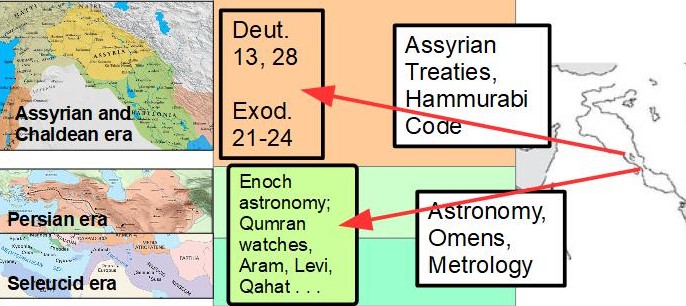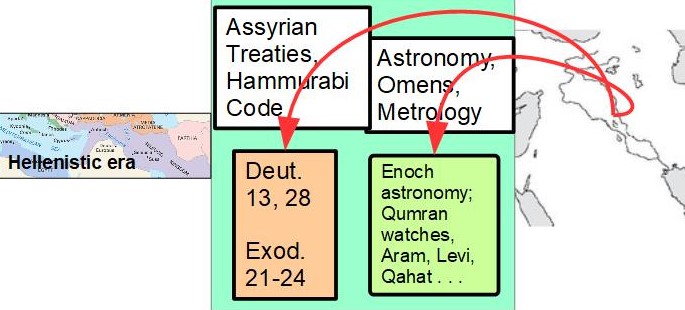We have two models for the origin of the biblical and its ancillary literature.
According to Seth Sanders in From Adapa to Enoch we have a progression from the late Iron Age to the Seleucid era.
- The early period (during the time of the kingdom of Judah before its exile) we have “public genres of power” that appear to draw upon the primarily cuneiform law codes and vassal treaties of Mesopotamia. In “Judea” these genres acquired a narrative framework.
- Later, in the postexilic period, we find instead secret genres of knowledge that drew upon the scribal traditions of omens, astronomy, etc. The primary facilitator for this development was the spread of the Aramaic script as a common scholarly language.

Russell Gmirkin’s view is that the above texts of Deuteronomy and Exodus are rather products of the Hellenistic era. The elements of the political and legal documents of Mesopotamia are relatively few and subsumed within the sort of literature that Plato was promoting in Laws. The narrative framing of such laws was also enjoined by Plato.
Gmirkin’s Plato and the Creation of the Hebrew Bible does not cover the noncanonical literature so the following diagram is my own, not Gmirkin’s. Throw the stones at me for what follows. I have, however, drawn upon other scholars who also set out reasons for their suspicions that the canonical texts were the product of the Persian and/or Hellenistic eras. (Philip Davies whom I mentioned in the previous post looks largely at the Persian era.)
I imagine that with this latter scenario there are different schools, some of them possibly opposed to each other. The diagram below makes it appear that they are contemporaneous but I do not think that should not be seen as strictly the case.
The diagram also only mentions the same texts as above (law codes and public curses) but that is only for comparison purposes. In fact just about everything from Genesis to Daniel is included here. (Philippe Wajdenbaum in Argonauts of the Desert extends the Greek influence from the legal codes to details of the narrative framework of those laws.) The pseudepigraphical texts are another story.
I am only running through a mind-game here. If there were in fact opposing scribal schools, and if the Greek literature was an influential factor in the formation of what became the canonical texts, do we find a glimpse of the origin of that division in the following passage of Plato’s Laws, Book 7. We know the Pentateuch condemned the study of the stars, but why?
ATHENIAN: Next let us see whether we are or are not willing that the study of astronomy shall be proposed for our youth.
CLEINIAS: Proceed.
ATHENIAN: Here occurs a strange phenomenon, which certainly cannot in any point of view be tolerated.
CLEINIAS: To what are you referring?
ATHENIAN: Men say that we ought not to enquire into the supreme God and the nature of the universe, nor
busy ourselves in searching out the causes of things, and that such enquiries are impious; whereas the very
opposite is the truth.CLEINIAS: What do you mean?
ATHENIAN: Perhaps what I am saying may seem paradoxical, and at variance with the usual language of
age. But when any one has any good and true notion which is for the advantage of the state and in every way
acceptable to God, he cannot abstain from expressing it.CLEINIAS: Your words are reasonable enough; but shall we find any good or true notion about the stars?
ATHENIAN: My good friends, at this hour all of us Hellenes tell lies, if I may use such an expression, about
those great Gods, the Sun and the Moon.CLEINIAS: Lies of what nature?
ATHENIAN: We say that they and divers other stars do not keep the same path, and we call them planets or
wanderers.CLEINIAS: Very true, Stranger; and in the course of my life I have often myself seen the morning star and
the evening star and divers others not moving in their accustomed course, but wandering out of their path in
all manner of ways, and I have seen the sun and moon doing what we all know that they do.ATHENIAN: Just so, Megillus and Cleinias; and I maintain that our citizens and our youth ought to learn
about the nature of the Gods in heaven, so far as to be able to offer sacrifices and pray to them in pious
language, and not to blaspheme about them.CLEINIAS: There you are right, if such a knowledge be only attainable; and if we are wrong in our mode of
speaking now, and can be better instructed and learn to use better language, then I quite agree with you that
such a degree of knowledge as will enable us to speak rightly should be acquired by us. And now do you try
to explain to us your whole meaning, and we, on our part, will endeavour to understand you.ATHENIAN: There is some difficulty in understanding my meaning, but not a very great one, nor will any
great length of time be required. And of this I am myself a proof; for I did not know these things long ago,
nor in the days of my youth, and yet I can explain them to you in a brief space of time; whereas if they had
been difficult I could certainly never have explained them all, old as I am, to old men like yourselves.CLEINIAS: True; but what is this study which you describe as wonderful and fitting for youth to learn, but
of which we are ignorant? Try and explain the nature of it to us as clearly as you can.ATHENIAN: I will. For, O my good friends, that other doctrine about the wandering of the sun and the
moon and the other stars is not the truth, but the very reverse of the truth. Each of them moves in the same
path−−not in many paths, but in one only, which is circular, and the varieties are only apparent. Nor are we
right in supposing that the swiftest of them is the slowest, nor conversely, that the slowest is the quickest.And if what I say is true, only just imagine that we had a similar notion about horses running at Olympia, or
about men who ran in the long course, and that we addressed the swiftest as the slowest and the slowest as the
swiftest, and sang the praises of the vanquished as though he were the victor,−−in that case our praises would
not be true, nor very agreeable to the runners, though they be but men; and now, to commit the same error
about the Gods which would have been ludicrous and erroneous in the case of men,−−is not that ludicrous
and erroneous?CLEINIAS: Worse than ludicrous, I should say.
ATHENIAN: At all events, the Gods cannot like us to be spreading a false report of them.
CLEINIAS: Most true, if such is the fact.
ATHENIAN: And if we can show that such is really the fact, then all these matters ought to be learned so far
as is necessary for the avoidance of impiety; but if we cannot, they may be let alone, and let this be our
decision.CLEINIAS: Very good.
Gods cannot behave erratically. Such a view would lead to an undermining of morality.
“Enoch”, however, was shown the secrets of the divine order in the heavens.
If Enoch is being shown secret wisdom it might also be worth keeping in mind that Plato did find a use for the teachings of certain mysteries. In is 9th book of Laws,
Let this be said as a prelude concerning crimes of violence in general; and I must not omit to mention a tradition which is firmly believed by many, and has been received by them from those who are learned in the mysteries: they say that such deeds will be punished in the world below, and also that when the perpetrators return to this world they will pay the natural penalty which is due to the sufferer, and end their lives in like manner by the hand of another.
If you enjoyed this post, please consider donating to Vridar. Thanks!


“We know the Pentateuch condemned the study of the stars, but why?”
Ancient mariners and desert travelers navigated thousands of miles of open ocean and desert, so the condemnation didn’t apply to their use of the stars. However, the use of the stars was necessary to diviners, not in the way of using omens or astronomy, but to know the direction they must face to ask a question. Native Americans were careful of the direction they must face in order to communicate with the unseen world. The flow of “waters” above and below, unseen by the naked eye, could be felt in the body. These were magnetic fields. Our bodies, being mostly water, conform to the steady paths of sun and moon.
Of course the Pentateuch would condemn the use of the stars, as the writers felt an urgency to rid the land of diviners, although they were mostly called sorcerers in the Pentateuch and the rest of the Bible.
Glad you are returning to the Hellenistic era theory.
I hope Gmirkin will give you a copy of his new article “Jeremiah, Plato and Socrates: Greek Antecedents to the Book of Jeremiah”
Dear Neil
I notice that you reference Yvonne Sherwood’s book on blasphemy in one of your posts. Can I draw your attention to her book The Invention of the Biblical Scholar: A Critical Manifesto (with Stephen Moore). It is a shrewd look at the history of Biblical scholarship from the Enlightenment onward, including a survey of the current field and its relationship to literary/critical theory. In some ways, it is more devastating to the idea of the historical Jesus than some of the mythicist/historicist debates since it questions the empiricist/historicist foundations of the field of Biblical Studies itself.
Will check it out, thanks. But I must add that I have quite a few other reads and posts to do waiting in my “in box”.